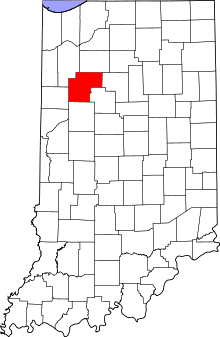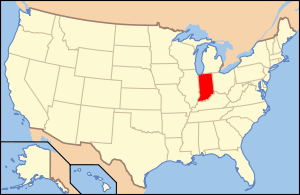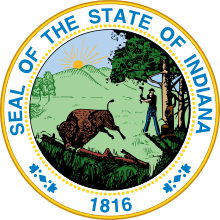White County, Indiana
| White County, Indiana | |
|---|---|
 White County Courthouse in Monticello | |
 Location in the U.S. state of Indiana | |
 Indiana's location in the U.S. | |
| Founded | 1834 |
| Named for | Isaac White |
| Seat | Monticello |
| Largest city | Monticello |
| Area | |
| • Total | 508.68 sq mi (1,317 km2) |
| • Land | 505.12 sq mi (1,308 km2) |
| • Water | 3.56 sq mi (9 km2), 0.70% |
| Population | |
| • (2010) | 24,643 |
| • Density | 50/sq mi (19/km²) |
| Congressional district | 4th |
| Time zone | Eastern: UTC-5/-4 |
| Footnotes: Indiana county number 91 | |
White County is a county located in the U.S. state of Indiana. As of the 2010 census, the population was 24,643.[1] The county seat is Monticello.[2]
History
White County was formed in 1834. It was named for Isaac White of Equality, Illinois who was killed at the Battle of Tippecanoe in 1811. White was a Colonel in the Illinois militia, who volunteered to serve as a Private in the Indiana militia in the march against Prophetstown. He was placed under the command of Kentucky Maj. Joseph Hamilton Daveiss. The two exchanged swords in a demonstration of mutual respect at Fort Vincennes. In the Battle of Tippecanoe they died together and were buried in a common grave at Battle Ground.
Geography
According to the 2010 census, the county has a total area of 508.68 square miles (1,317.5 km2), of which 505.12 square miles (1,308.3 km2) (or 99.30%) is land and 3.56 square miles (9.2 km2) (or 0.70%) is water.[3]
Adjacent counties
- Pulaski County (north)
- Cass County (east)
- Carroll County (southeast)
- Tippecanoe County (south)
- Benton County (west)
- Jasper County (northwest/CST Border)
Cities and towns
Unincorporated towns
Townships
Major highways
 Interstate 65
Interstate 65 U.S. Route 24
U.S. Route 24 U.S. Route 231
U.S. Route 231 U.S. Route 421
U.S. Route 421 Indiana State Road 16
Indiana State Road 16 Indiana State Road 18
Indiana State Road 18 Indiana State Road 39
Indiana State Road 39 Indiana State Road 43
Indiana State Road 43 Indiana State Road 119
Indiana State Road 119
Railroads
Climate and weather
| Monticello, Indiana | ||||||||||||||||||||||||||||||||||||||||||||||||||||||||||||
|---|---|---|---|---|---|---|---|---|---|---|---|---|---|---|---|---|---|---|---|---|---|---|---|---|---|---|---|---|---|---|---|---|---|---|---|---|---|---|---|---|---|---|---|---|---|---|---|---|---|---|---|---|---|---|---|---|---|---|---|---|
| Climate chart (explanation) | ||||||||||||||||||||||||||||||||||||||||||||||||||||||||||||
| ||||||||||||||||||||||||||||||||||||||||||||||||||||||||||||
| ||||||||||||||||||||||||||||||||||||||||||||||||||||||||||||
In recent years, average temperatures in Monticello have ranged from a low of 17 °F (−8 °C) in January to a high of 86 °F (30 °C) in July, although a record low of −25 °F (−32 °C) was recorded in January 1963 and a record high of 107 °F (42 °C) was recorded in July 1954. Average monthly precipitation ranged from 1.94 inches (49 mm) in February to 4.16 inches (106 mm) in July.[4]
Government
The county government is a constitutional body, and is granted specific powers by the Constitution of Indiana, and by the Indiana Code.
County Council: The county council is the legislative branch of the county government and controls all the spending and revenue collection in the county. Representatives are elected from county districts. The council members serve four-year terms. They are responsible for setting salaries, the annual budget, and special spending. The council also has limited authority to impose local taxes, in the form of an income and property tax that is subject to state level approval, excise taxes, and service taxes.[5][6]
Board of Commissioners: The executive body of the county is made of a board of commissioners. The commissioners are elected county-wide, in staggered terms, and each serves a four-year term. One of the commissioners, typically the most senior, serves as president. The commissioners are charged with executing the acts legislated by the council, collecting revenue, and managing the day-to-day functions of the county government.[5][6]
Court: The county maintains a small claims court that can handle some civil cases. The judge on the court is elected to a term of four years and must be a member of the Indiana Bar Association. The judge is assisted by a constable who is also elected to a four-year term. In some cases, court decisions can be appealed to the state level circuit court.[6]
County Officials: The county has several other elected offices, including sheriff, coroner, auditor, treasurer, recorder, surveyor, and circuit court clerk. Each of these elected officers serves a term of four years and oversees a different part of county government. Members elected to county government positions are required to declare party affiliations and to be residents of the county.[6]
Demographics
| Historical population | |||
|---|---|---|---|
| Census | Pop. | %± | |
| 1840 | 1,832 | — | |
| 1850 | 4,761 | 159.9% | |
| 1860 | 8,258 | 73.5% | |
| 1870 | 10,554 | 27.8% | |
| 1880 | 13,795 | 30.7% | |
| 1890 | 15,671 | 13.6% | |
| 1900 | 19,138 | 22.1% | |
| 1910 | 17,602 | −8.0% | |
| 1920 | 17,351 | −1.4% | |
| 1930 | 15,831 | −8.8% | |
| 1940 | 17,037 | 7.6% | |
| 1950 | 18,042 | 5.9% | |
| 1960 | 19,709 | 9.2% | |
| 1970 | 20,995 | 6.5% | |
| 1980 | 23,867 | 13.7% | |
| 1990 | 23,265 | −2.5% | |
| 2000 | 25,267 | 8.6% | |
| 2010 | 24,643 | −2.5% | |
| Est. 2015 | 24,293 | [7] | −1.4% |
| U.S. Decennial Census[8] 1790-1960[9] 1900-1990[10] 1990-2000[11] 2010-2013[1] | |||
As of the 2010 United States Census, there were 24,643 people, 9,741 households, and 6,849 families residing in the county.[12] The population density was 48.8 inhabitants per square mile (18.8/km2). There were 12,970 housing units at an average density of 25.7 per square mile (9.9/km2).[3] The racial makeup of the county was 93.9% white, 0.4% Asian, 0.3% American Indian, 0.3% black or African American, 3.7% from other races, and 1.4% from two or more races. Those of Hispanic or Latino origin made up 7.1% of the population.[12] In terms of ancestry, 27.0% were German, 13.3% were Irish, 9.7% were English, and 8.4% were American.[13]
Of the 9,741 households, 31.3% had children under the age of 18 living with them, 56.1% were married couples living together, 9.3% had a female householder with no husband present, 29.7% were non-families, and 24.8% of all households were made up of individuals. The average household size was 2.50 and the average family size was 2.96. The median age was 41.9 years.[12]
The median income for a household in the county was $47,697 and the median income for a family was $52,626. Males had a median income of $39,715 versus $28,880 for females. The per capita income for the county was $22,323. About 7.7% of families and 9.5% of the population were below the poverty line, including 13.0% of those under age 18 and 4.5% of those age 65 or over.[14]
Education
Public schools in White County are administered by the Frontier School Corporation, North White School Corporation, Tri-County School Corporation and Twin Lakes School Corporation.
High Schools and Middle Schools
- Tri-County Middle/Senior High School
- Frontier Junior-Senior High School
- North White High School
- North White Middle School
- Roosevelt Middle School
- Twin Lakes High School
Elementary Schools
- Eastlawn Elementary School
- Frontier Elementary School
- Meadowlawn Elementary School
- Monon Elementary School
- Oaklawn Elementary School
- Tri-County Intermediate School
See also
References
- 1 2 "White County QuickFacts". United States Census Bureau. Retrieved 2011-09-25.
- ↑ "Find a County". National Association of Counties. Retrieved 2011-06-07.
- 1 2 "Population, Housing Units, Area, and Density: 2010 - County". United States Census Bureau. Retrieved 2015-07-10.
- 1 2 "Monthly Averages for Monticello, Indiana". The Weather Channel. Retrieved 2011-01-27.
- 1 2 Indiana Code. "Title 36, Article 2, Section 3". IN.gov. Retrieved 2008-09-16.
- 1 2 3 4 Indiana Code. "Title 2, Article 10, Section 2" (PDF). IN.gov. Retrieved 2008-09-16.
- ↑ "County Totals Dataset: Population, Population Change and Estimated Components of Population Change: April 1, 2010 to July 1, 2015". Retrieved July 2, 2016.
- ↑ "U.S. Decennial Census". United States Census Bureau. Retrieved July 10, 2014.
- ↑ "Historical Census Browser". University of Virginia Library. Retrieved July 10, 2014.
- ↑ "Population of Counties by Decennial Census: 1900 to 1990". United States Census Bureau. Retrieved July 10, 2014.
- ↑ "Census 2000 PHC-T-4. Ranking Tables for Counties: 1990 and 2000" (PDF). United States Census Bureau. Retrieved July 10, 2014.
- 1 2 3 "DP-1 Profile of General Population and Housing Characteristics: 2010 Demographic Profile Data". United States Census Bureau. Retrieved 2015-07-10.
- ↑ "DP02 SELECTED SOCIAL CHARACTERISTICS IN THE UNITED STATES – 2006-2010 American Community Survey 5-Year Estimates". United States Census Bureau. Retrieved 2015-07-10.
- ↑ "DP03 SELECTED ECONOMIC CHARACTERISTICS – 2006-2010 American Community Survey 5-Year Estimates". United States Census Bureau. Retrieved 2015-07-10.
External links
| Wikimedia Commons has media related to White County, Indiana. |
- Hamelle, W.H. (ed.) (1915). A Standard History of White County Indiana: An Authentic Narrative of the Past, with an Extended Survey of Modern Developments in the Progress of Town and Country. Chicago and New York: Lewis Publishing Company. Retrieved 2007-02-04.
 |
Jasper County | Pulaski County |  | |
| Benton County | |
Cass County | ||
| ||||
| | ||||
| Tippecanoe County | Carroll County |
Coordinates: 40°45′N 86°52′W / 40.75°N 86.86°W
